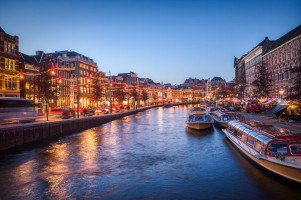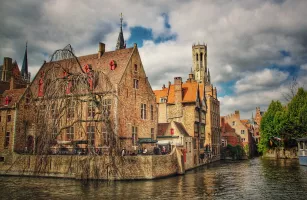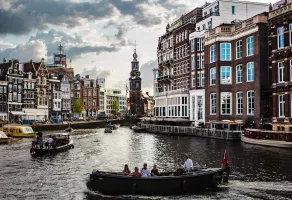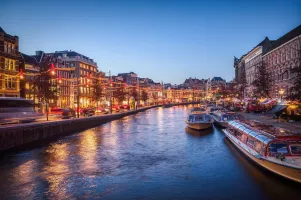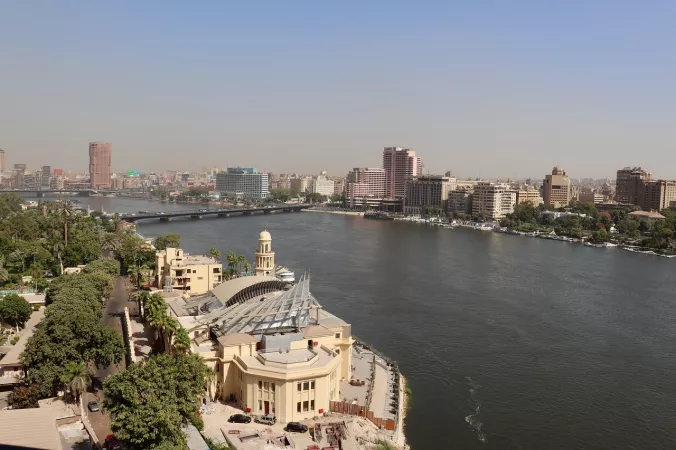
The Nile River Travel Guide
The Nile River is a legendary waterway that has played a crucial role in the history, geography, and culture of Egypt and other African countries. Known as the longest river in the world, the Nile has been a lifeline for civilizations, offering fertile lands for agriculture and transportation routes for trade. It is famous for its ancient connections to Egyptian pharaohs, majestic temples, and scenic landscapes.Top Attractions in The Nile River
- Valley of the Kings
- Great Sphinx of Giza
- Luxor Temple
- Aswan High Dam
- Nubian Museum
The Nile River is Famous for
Cruising along the river on traditional feluccas and exploring the iconic temples and tombs along its banks.Top Attractions in The Nile River
- Exploring ancient Egyptian temples
- Cruising on a traditional felucca
- Visiting bustling bazaars
- Relaxing at riverside resorts
- Experiencing local culture and cuisine
What's Great about Travelling to The Nile River?
- History buffs will be in awe of the ancient sites
- Nature lovers can enjoy scenic landscapes along the river
- Cultural enthusiasts will immerse in Egyptian traditions
What's Not So Great about Travelling to The Nile River?
- Hot temperatures can be challenging for some travelers
- Crowds can be overwhelming at popular tourist sites
- Language barriers may pose communication challenges
Travel Tips for The Nile River
- Obtain a visa before your trip
- Book a Nile cruise for a unique experience
- Stay hydrated and wear sunscreen in the sun
Important The Nile River trip information
- Ideal Duration: 7-10 days to explore the main attractions
- Best Time to Visit: From October to April for cooler temperatures
- Nearby Airports and Railway Stations: Cairo International Airport and Luxor Railway Station
Per Person
70,000
*EXCLUDING APPLICABLE TAXES 5.0 Ratings
( 4 Reviews )
( 4 Reviews )
Total
15,32,000
*EXCLUDING APPLICABLE TAXES 5.0 Ratings
( 20 Reviews )
( 20 Reviews )
Total
3,94,500
*EXCLUDING APPLICABLE TAXES 5.0 Ratings
( 20 Reviews )
( 20 Reviews )
Total
5,55,000
*EXCLUDING APPLICABLE TAXES 5.0 Ratings
( 20 Reviews )
( 20 Reviews )
Total
3,19,500
*EXCLUDING APPLICABLE TAXES 5.0 Ratings
( 20 Reviews )
( 20 Reviews )
Total
16,94,500
*EXCLUDING APPLICABLE TAXES 5.0 Ratings
( 20 Reviews )
( 20 Reviews )
FAQ's on The Nile River
Q1: What is the best time to visit The Nile River?
The best time to visit The Nile River is during the dry season, which typically runs from December to February and June to August. During these months, the weather is pleasantly warm, and the river is at its most navigable state. Additionally, this period coincides with fewer tourists, allowing for a more peaceful experience. However, if you are interested in witnessing the river at its fullest, consider visiting during the wet season from September to November.
Q2: Do I need a visa to travel to The Nile River?
Tourists traveling to The Nile River typically require a visa for entry. It is advisable to check with the nearest Egyptian embassy or consulate for the most up-to-date visa requirements. There are some visa exemptions for certain nationalities, such as citizens of some Arab countries. Make sure to have a valid passport with at least six months' validity beyond your intended stay.
Q3: What are the must-visit attractions in The Nile River?
The must-visit attractions along The Nile River include the iconic Pyramids of Giza, the stunning temples of Luxor and Karnak, the Valley of the Kings, and the bustling markets of Cairo. A cruise along the Nile is also a popular way to experience the river, with stops at historic sites along the way. Don't miss the chance to explore the Nubian villages, Aswan's Philae Temple, and the beauty of Abu Simbel.
Q4: Is The Nile River a safe place to travel?
The Nile River is generally a safe destination for travelers. However, like any other tourist hotspot, it is essential to remain cautious and aware of your surroundings. Avoid venturing into isolated areas and be vigilant of pickpockets in crowded places. It's recommended to follow local news and advisories and adhere to any safety guidelines provided by authorities.
Q5: What is the local currency in The Nile River and can I use credit cards?
The local currency in Egypt, where The Nile River flows, is the Egyptian Pound (EGP). While credit cards are widely accepted in major hotels, restaurants, and shops in tourist areas, it's advisable to carry some cash for smaller establishments or markets that may not accept cards. ATMs are available in cities along the Nile, making it convenient to withdraw cash in local currency.
Q6: What is the local cuisine like in The Nile River?
The local cuisine along The Nile River offers a delightful array of flavors and dishes. Traditional Egyptian food includes classics like koshari (a mix of rice, lentils, and pasta topped with spicy tomato sauce), falafel, and ful medames (mashed fava beans). Seafood dishes are popular in coastal areas, while meat lovers can enjoy dishes like kebabs and kofta. Vegetarians will find plenty of options like stuffed vine leaves and vegetable tagines. Don't miss trying the sweet treats like baklava and basbousa for a taste of local desserts.
Q7: What transportation options are available in The Nile River?
Transportation options along The Nile River include traditional felucca boats for leisurely cruises, especially in Luxor and Aswan. For longer distances, consider taking a Nile cruise that offers a luxurious way to travel between key attractions. In cities like Cairo, Alexandria, and Luxor, you can use taxis, Uber, or public transport like buses and metro. Car rentals are also available for those who prefer more independence in exploring the region.
Q8: Are there any cultural norms or etiquette I should be aware of when visiting The Nile River?
When visiting The Nile River, it's important to respect local customs and etiquette. Dress modestly, especially when visiting religious sites, by covering your shoulders and knees. Always ask for permission before taking photos of locals, as some may prefer not to be photographed. When dining, wait for the host or elder to start eating before you begin. It's customary to greet people with a handshake and maintain a respectful distance while conversing. Remember to remove your shoes when entering someone's home and avoid public displays of affection. By being mindful of these cultural norms, you can show respect for the local traditions and enhance your travel experience along The Nile River.
Q9: I am a travel agent. How can I buy travel leads of The Nile River?
Register yourself as a travel agent at agents.tripclap.com and then you can buy travel leads to The Nile River once your account is approved. For more details contact our support team at +91-8069186564 or support@tripclap.com
